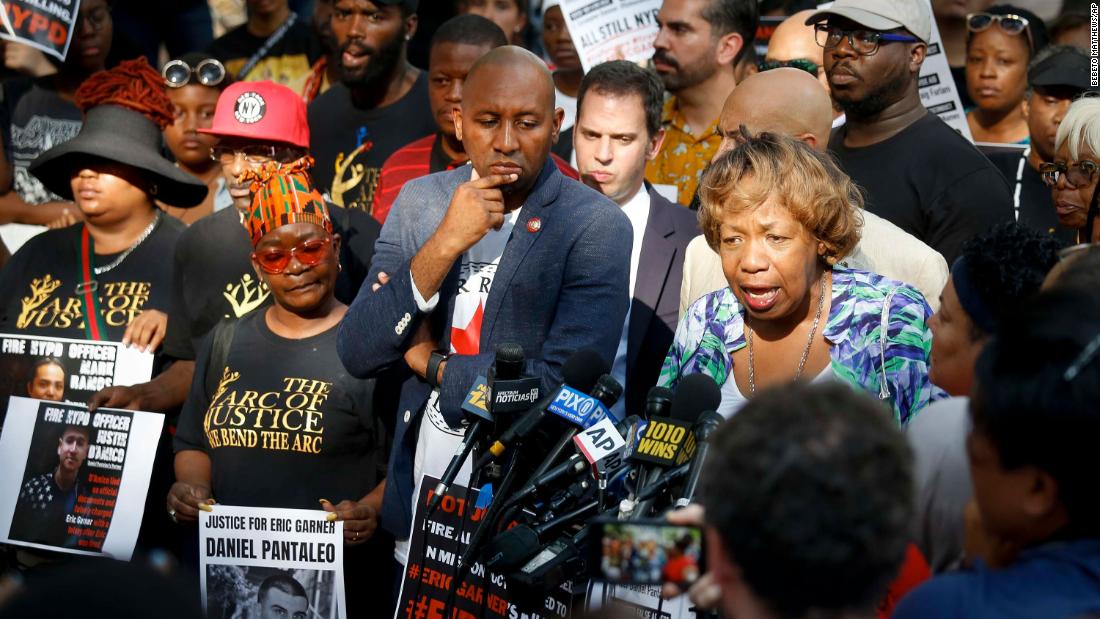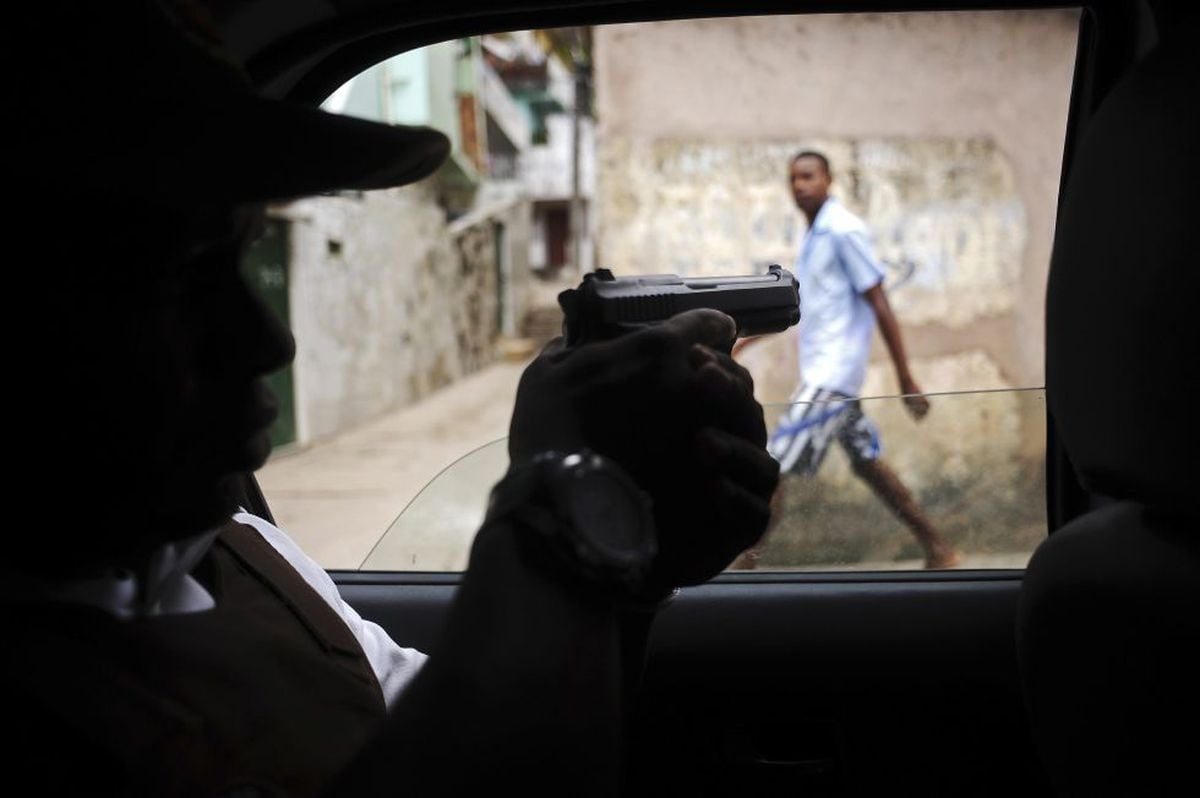Prosecution: George Floyd asked for help with his last breath 1:51
(CNN) -
Tiffany Crutcher still remembers the numbness she felt when a jury announced that it would acquit a Tulsa police officer charged with manslaughter in the death of her twin brother Terence Crutcher.
After nationwide protests over her death, posting the police dash cam video and standing for nine hours of jury deliberation, Crutcher said she was confident her family would get justice.
But when justice did not come, he said he had to accept a harsh reality.
"You can have the police killings videotaped and they still get away with it," Crutcher said.
"The system we live in was never really designed to protect blacks."
Army prepares to approve Washington's request to appeal to the National Guard pending verdict in Derek Chauvin's trial
Tiffany Crutcher, Terence Crutcher's sister, appears on stage with family members during events to mark Juneteenth or Emancipation Day.
While George Floyd's family awaits conviction in the trial of former Minneapolis Police Officer Derek Chauvin, Crutcher and loved ones of other victims of police brutality caution against assuming he will not be acquitted.
In many cases, black families have endured days and weeks of trials that ended without a conviction for the accused police officers or a much shorter sentence than they expected.
Other families have demanded accountability just so that prosecutors and investigative juries will not press charges or prosecute police officers at all.
advertising
These mothers, fathers, sisters and brothers of the victims stand in solidarity with the Floyd family and say they understand the agonizing wait for justice in a legal system that often sides with police officers.
Some say they saw the attorneys paint the same dark picture of their deceased loved ones as Chauvin's defense attorneys did about Floyd this week when they said it was underlying health problems, complicated by a drug overdose, and not the pressure from Chauvin's knee, the ones who killed him.
Gwen Carr, Eric Garner's mother, traveled to Minneapolis during the early days of the trial to support the Floyd family.
He knelt for 8 minutes and 46 seconds with Floyd's family, attorneys and supporters, outside the Minneapolis courthouse on Monday, to mark the final moments of his life.
During last week's trial it was revealed that Chauvin knelt on Floyd's neck for 9 minutes and 29 seconds.
Carr told CNN that he can relate to the loss of a loved one who repeatedly said "I can't breathe" before being killed by police.
She said she was glad to see an immediate layoff, murder charges against Chauvin and a trial because she received none of that for Garner's death.
The police officer who strangled Garner while arresting him was not fired until five years after Garner's death.
Still, Carr warns that the Floyd family may have to prepare for a possible acquittal.
"Don't think this is going to be a piece of cake, even if you have a video," Carr said. "I had a video for everyone to see and still no police were charged in my son's case."
Philonise Floyd, George Floyd's brother, told CNN earlier this week that justice for his family is a sentence for Chauvin.
Jury begins deliberating in Derek Chauvin's trial for George Floyd's death
Gwen Carr, right, the mother of strangulation victim Eric Garner, surrounded by supporters as she speaks during a news conference outside NYPD headquarters.
"Many times I have seen black people murdered and no one gets a conviction," Floyd said.
“We are all fighting across the United States, not just me.
You see protesters all over the world.
Everyone is defending George Floyd.
If you can't get justice in the United States for this, why can you get justice then? '
Why it is difficult to convict police officers
One expert said that many of these families never get justice because it is difficult to convict a police officer of murder.
Kenneth Nunn, a professor at the University of Florida Levin School of Law, said prosecutors must be able to show that a police officer was negligent, unreasonable and reckless when he used deadly force.
Demonstrating this is especially difficult for black victims because police in the United States have historically been racist since slave patrols used violence to control the black community, Nunn said.
Some white people, he said, associate the presence of black Americans with crime.
Because of this, white juries can side with the police they trust are fulfilling their oath to protect the community.
A 2019 Pew Research Center study found that nearly 65% of black adults report experiencing someone they were suspicious of because of their race compared to 25% of whites.
The 14 jurors selected for Chauvin's trial include eight white people, four black people and two people of mixed race.
Jurors were required to complete a 16-page questionnaire asking their personal thoughts on Black Lives Matter, policing, and other topics.
"I don't think the average white jury or the average white citizen wants to see black people killed by the police," Nunn said.
"But when they see those murders, they weigh with 'well, we are concerned about security in our community, these are the people who provide it, we want to give them a little freedom.'
Derek Chauvin's defense uses these 3 arguments to try to get an acquittal in the death of George Floyd
Witnesses say they feel guilty for Floyd's death 3:06
Families Say "Stand Up"
During the first week of the trial, bystanders testified of their horror and fear at watching Floyd die on May 25, 2020. His testimony, along with eyewitness videos, are the backbone of the state's case.
But the families of other black men and women killed by the police warned the Floyd family that the defense will try to smear their character.
The Terence Crutcher Foundation issued a statement on Monday warning the Floyd family that the defense would conduct psychological work against Floyd.
"[…] George will be vilified and blamed for his own death, you will have to relive the horrible event over and over again," the statement said.
"But STAY FIRM and know that we are with you and stand in solidarity with you as you endure the inconceivable."
During opening statements, defense attorney Eric Nelson cited Floyd's use of fentanyl and methamphetamine and his heart problems as the cause of his death.
He said Floyd was resisting arrest and that Chauvin was undergoing proper police training.
"They should know that Derek Chauvin did exactly what he had been trained to do over the course of his 19-year career," Nelson said.
"The use of force is not attractive, but it is a necessary component of policing."
Nelson was also criticized for suggesting that Donald Williams, a black man who witnessed Floyd's death, became "angry" at the scene because he shouted obscenities at officers telling them to leave Floyd behind.
Critics said Nelson used a stereotype that characterizes black men and women as hostile and overly aggressive.
No, you can't paint me as angry;
I'd say he was in a position where he had to be controlled, ”Williams said as Nelson questioned him.
"Williams is not an angry black man just because he spoke out," CNN commentator Keith Boykin tweeted Tuesday.
The memory of George Floyd at the Wright protests 0:45
A «manual» that is «activated»
Tiffany Crutcher said the opening statements at Chauvin's trial made her anxious.
It brought her back to the trial of former Tulsa Police Officer Betty Shelby, who was acquitted in the shooting death of Terence Crutcher.
Defense attorneys, he said, brought up Crutcher's drug addiction history during the trial.
"This is exactly the same manual they used in my brother's trial," he said.
"It is wicked and it is activating."
Valerie Castile, Philando Castile's mother, said that watching Chauvin's trial has been "re-traumatizing."
Castile said attorneys also tried to frame his son, saying he had marijuana in his system when he was killed by Minnesota police officer Jeronimo Yáñez in 2016. Yáñez was acquitted of all charges in the shooting death of Philando Castile.
Castile said he has little faith in the criminal justice system and identifies with the Floyd family as they watch the trial.
"You have to have very tough skin to sit there and listen to all that," Castile said.
"Nothing surprises me with these people in Minnesota because they have gotten away with it for many years."
Botham Jean's family was one of those who got the murder conviction they wanted for former Dallas Police officer Amber Guyger, who shot Jean to death when he entered her apartment thinking it was hers in 2018. Guyger went sentenced to 10 years in prison.
The case sparked a national conversation about forgiveness when Jean's younger brother Brandt Jean told Guyger in court that he forgave her before reaching out to hold her tightly for nearly a minute.
Brandt Jean also said that he did not want Guyger to go to prison.
Jean's sister, Allisa Charles-Findley, however, felt different.
Charles-Findley said he believed Guyger deserved a life sentence for killing Jean.
"At 26 he cut off your life shortly and then you still have a chance to live?" Said Charles-Findley.
You can have children, you can get married, you can do all those things that Botham will never have a chance to do.
Charles-Findley said he does not believe the criminal justice system was created to protect blacks.
He encouraged the Floyd family to pray and maintain a strong support system during the trial.
"We have to protect our own, so I would definitely recommend that you have no illusions," he said.
Police Brutality George Floyd






